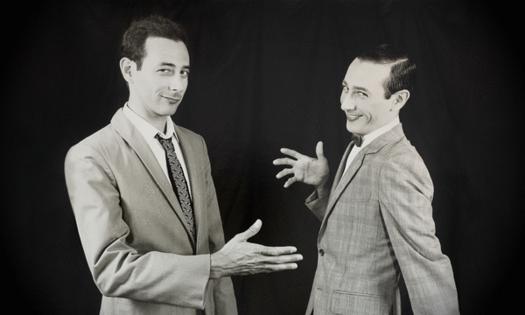Rick Kogan: You know him as Pee-wee Herman -- a new documentary dives into the life of Paul Reubens
Published in Entertainment News
CHICAGO — Of the very many famous people who admired the late comic actor Paul Reubens’ singular creation named Pee-wee Herman — among them Conan O’Brien, Jimmy Kimmel, film director John Waters, Lily Tomlin, Beverly D’Angelo, Jason Alexander and others — one of the most surprising might be Mike Royko.
“At first, when ‘Pee-wee’s Playhouse’ was brand new, the character annoyed me,” says Royko’s eldest son, clinical psychologist, writer and critic David Royko. “Somehow, he came up when Dad and I were talking, and it shocked me when it turned out that he was a huge fan. Right then, he started imitating Pee-wee, his facial expressions, and, especially, his voice. Pee-wee cracked him up, big time. Dad was the first rabid Pee-wee Herman fan I knew.”
Mike Royko knew talent and he knew funny and he was one among millions who were drawn to the bow-tied, suit-wearing, toy-loving man-child with a distinctively high-pitched way of talking, a wild laugh and unbridled enthusiasm that Reubens developed over years before exploding into the national consciousness with an HBO special in 1981 and in films (the hit “Pee-wee’s Big Adventure,” director Tim Burton’s first feature film in 1985, and the less successful “Big Top Pee-wee” in 1987) and on frequent appearances on David Letterman’s late-night shows and in the TV series “Pee-wee’s Playhouse,” which ran Saturday mornings on CBS from 1986 to 1990.
We hear from some of his fans and from others who knew Reubens intimately, but mostly from Reubens himself in a compelling, two-part, three-hour-long HBO documentary, “Pee-wee as Himself.”
The film is the work of Matt Wolf, who spent many years wooing Reubens and four years making the movie. As Wolf has written, “For years, my dream documentary subject was Paul Reubens. Throughout my childhood, a Pee-wee pull-string doll dangled above my bed, and I’d stare at it every night before falling asleep.”
What he wanted to create was a portrait of an artist, and that is what we get, but we also meet a complicated man who hid parts of himself behind the playful Pee-wee.
We go to Sarasota, Florida, where Reubens was born and raised, and influenced by the characters of the Ringling Bros. circus that made the town its home base. His parents, Judy and Milton, seem to be fine and supportive folks, if the dad was a bit rough around the edges.
A modestly successful child actor in regional theater Reubens earned a Bachelor of Fine Arts degree from the California Institute of the Arts in Santa Clara, becoming that rare breed of conceptual artist who also craves fame.
Naturally it was off to Los Angeles and his years with the Groundlings, the noted Los Angeles-based improv group, where he became friends, for a time, with future star “Saturday Night Live” star Phil Hartman, and where Pee-wee came to life.
His first paying performance as Pee-wee came, of all odd places, on “The Dating Game.”
He was picked and stardom came fast over the next decade.
But it also came crashing down in the wake of his 1991 arrest in an adult movie theater in Florida and a charge of indecent exposure. He said the charge was false but pleaded no contest. Still, the headlines were so garish, the late-night jokes so intense that CBS felt compelled to pull episodes of “Playhouse.” Though he did manage to work as a voice-over artist and sometime TV guest, in 2002 he was arrested on charges of child pornography, stemming from his vast collection of vintage erotica. The charges were later dropped, but still remained tied to his fame as a kids’ TV star.
He does not talk about either of these incidents at any length in the film, but there is enough in the more than 1,000 hours of archival film and interviews with his family and friends to provide ample evidence that he was unfairly victimized.
Much of the film’s 40-hour interview segments with Ruebens were filmed in his sprawling mid-century Los Angeles house jammed with archives and collectibles. There are indeed some awkward moments between Reubens and Wolf, though one surely senses the filmmaker’s affection and admiration for his subject.
During these sessions, often tense, Reubens talked publicly for the first time about his sexuality — he was gay — and detailed lovingly his college boyfriend, an artist named Guy.
Reubens was a man of many secrets, and the last one is chilling. As Wolf was preparing for one final interview, he, along with the rest of the world, learned on July 30, 2023, that Reubens was dead at 70, the victim of cancer that he had privately battled for six years. He had, however, the day before he died, made a tape recording on which he talked of that 2002 arrest. You will hear him, near the film’s end, his voice weak, saying, “More than anything, the reason I wanted to make a documentary was to let people see who I really am and how painful and difficult it was to be labeled something I wasn’t. The moment I heard somebody label me as, I’m just going to say it, a pedophile, I knew it was going to change everything moving forward and backwards.”
David Royko and his wife Karen loved this documentary. So did I. It is a bit long but worth your time. It punctuates what a grand and influential talent Reubens was and how his greatest creation captured hearts and minds. The movie, the life of a complicated genius, will stay with you for keeps.
———
(Rick Kogan is a columnist for the Chicago Tribune.)
———
©2025 Chicago Tribune. Visit chicagotribune.com. Distributed by Tribune Content Agency, LLC.













Comments